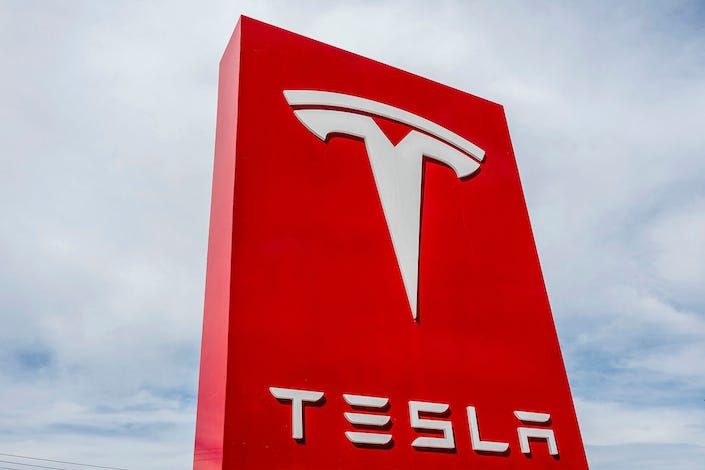Free to Read: Tesla’s Full Self-Driving Trial in China Delayed by Regulatory Checks
Tesla’s FSD system still awaits regulatory approval in China after stricter rules imposed
Signage at a Tesla store in Colma, California on March 10, 2025. Photo by Bloomberg
Tesla’s highly anticipated trial launch of its Full Self-Driving (FSD) system in China has suffered a setback, as some users report not receiving the feature update due to a delay in regulatory approval.
Tesla China said Monday that it is working to secure government approval for both software and hardware under new national guidelines issued by China’s Ministry of Industry and Information Technology and the State Administration for Market Regulation. The company said the trial will resume once all preparations are complete.
The FSD system, which still requires driver supervision, is Tesla’s most advanced driver-assistance software. Previously only available in North America, it made its debut in China on Feb. 25, drawing widespread industry attention. Tesla subsequently announced a one-month free trial for eligible vehicles beginning March 17.
However, new regulations issued on Feb. 28 introduced stricter requirements for intelligent connected vehicles, including enhanced product quality oversight, recall protocols, software update supervision and compliance reporting. Companies must also submit detailed technical parameters and test data to authorities, and file over-the-air upgrade plans to ensure compliance with Chinese laws and standards.
So far, no public updates have been issued on FSD’s approval status in China, raising concerns Tesla could lose ground in an increasingly competitive market.
Tesla faces mounting pressure internationally as well. The company’s chief executive Elon Musk’s overt political involvement in the 2024 U.S. presidential election — including his endorsement of Donald Trump and appointment to lead a newly created federal Department of Government Efficiency — has caused a widespread backlash. His controversial far-right comments have fueled the rise of the “Tesla Takedown” movement, with protests spreading across the U.S., Canada and Europe.
The fallout has affected Tesla’s bottom line. According to Marklines and Cox Automotive, Tesla’s U.S. sales in February fell about 5% year-on-year and 10% from January, marking the fourth consecutive month of decline.
In Europe, Tesla’s sales fell 49% year-on-year in the first two months of 2025, while overall EV sales in the European Union rose 28.4%, according to the European Automobile Manufacturers Association.
In a show of support for Musk, Trump bought a Tesla Model S on March 11. Musk responded by holding a company-wide meeting on March 20 to boost internal morale and reassure investors.
The situation escalated on March 24 when the FBI announced the formation of a special task force to investigate a series of violent incidents targeting Tesla stores. Several incendiary devices were reportedly discovered that day at a Tesla showroom in Austin, Texas.
Despite the turmoil abroad, Tesla’s operations in China have been unaffected by Musk’s political activities so far. In fact, Tesla benefited from China’s “trade-in” incentives for car purchases, helping lift global sales in 2024. But with rising geopolitical tensions and regulatory headwinds, Tesla’s future in its most crucial overseas market now hangs in the balance.




